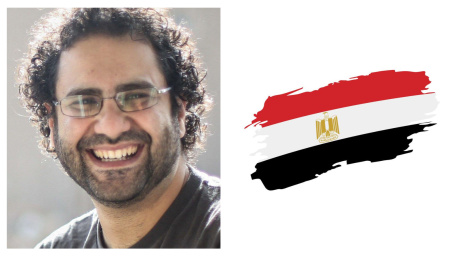By Jheruleene Anne Ramos
United Nations human rights experts are pressuring the Egyptian government to immediately release jailed Egyptian-British activist and writer Alaa Abdel El-Fattah.
On Thursday February 27, four UN special rapporteurs urged President Abdel Fattah El-Sisi to release El-Fattah, who was sentenced to five years for allegedly “spreading false news”. They argued that his continued imprisonment is unlawful.
“Mr. El-Fattah remains in prison despite having completed his most recent sentence on 29 September 2024 because Egyptian authorities refuse to acknowledge the time he spent in pre-trial detention,” they said, as quoted by The New Arab.
They also called on the government to “halt its flagrant crackdown on expression and respect its obligations under international human rights law.”
Rights groups amplify calls for release
Human Rights Watch (HRW) echoed the UN’s appeal, urging Egyptian authorities to grant El-Fattah clemency after nearly a decade behind bars.
In a joint statement, human rights leaders, writers and media figures pressed Sisi to release him and consider his pre-trial detention period.
YOU MAY ALSO LIKE: UN chief champions our common humanity as Ramadan begins

Similarly, Reporters Without Borders (RSF) echoed these sentiments last week, emphasising that the government must free him “without further delay.”
RSF also urged the international community to push for justice and prevent future human rights abuses.
“What is urgently needed now is a global push for justice for Alaa. Now is the time to act: Egypt’s disregard for the rule of law and human rights must not be allowed to go on,” RSF United Kingdom director Fiona O’Brien said.
El-Fattah’s mother’s health deteriorates amid hunger strike
The calls for his release have intensified as concerns grow over the health of his mother, Laila Soueif, who is on hunger strike in protest of his imprisonment.
The 68-year-old, who has lost nearly 30 kilograms since she began her strike, was hospitalised at St. Thomas’ Hospital in London on February 24 due to dangerously low blood sugar.
The doctors have warned that she faces an “immediate risk to life” and is “in particular at high risk of sudden death” if she continues to refuse food.
She has been on hunger strike for nearly five months in protest against the imprisonment of her son, a key opposition figure in the 2011 uprising against long-standing former president Hosni Mubarak.
A mathematics professor and long-time activist, Soueif has been consuming only herbal tea, black coffee and rehydration salts since her son was not freed on his scheduled release date last September.
Egyptian MP questions delay in release
In response to growing pressure, Egyptian lawmaker Freddy al-Baiady submitted an inquiry to Prime Minister Mostafa Madbouly and other officials on March 1, demanding an explanation for El-Fattah’s continued detention.
Al-Baiady emphasised that the activist should have been released in September 2024, especially with his record proving clear legal infringements.
He argued that the delay contradicts Article 54 of the Egyptian Constitution, which prohibits imprisonment without a court-sanctioned inquiry, and Article 480 of the Criminal Procedures Law, which mandates the immediate release of detainees upon completing their sentence.
Egyptian government remains firm
Despite mounting international pressure, Egyptian authorities insist that El-Fattah will not be released until 2027.
British Prime Minister Keir Starmer assured El-Fattah’s family last month that the UK government is working “intensively” on the case.
“The prime minister recently wrote to Laila Soueif, reaffirming that all levels of government are engaged and that progress is possible, though it will take time,” a UK government spokesperson told the BBC.
READ NEXT: Oscars news: Liverpool man wins 2025 Academy Award for work on Wicked
